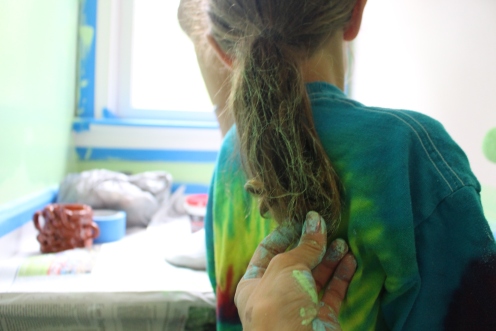Long ago, back before the button was invented (and I’m not talking about the kind of button that keeps your pants up), eight-year-old children would wake up before the sun and go out to milk cows. Ten-year-old children would make bread from scratch. Twelve-year-old children would saddle their horse and bring home lost sheep.
Now there is very little for an American child to do besides enjoy one leisure activity after another.
But just because we don’t live on farms anymore doesn’t mean we can’t still teach our children how to work. Scott and I encourage our children to work from a very young age. So far all of my daughters can wash dishes by hand, unload the dishwasher, make cookies from scratch, put sheets on their own bed, make simple dinners on the stove, fold and put away all their own laundry and wield a paintbrush. My four-year-old son can water plants, wash windows, bring groceries in from the car and open the door for me when I am pushing the stroller.

Ironically with all of this working my house still seems to be mess. But that is because we are a project family.
I was told once that the key to building confidence in children is not with compliments but with accomplishments. We are not perfect at this, but here are some things we have learned so far:
1. Complaining is Wonderful
. . . because that means they are doing something hard. We are not afraid of complaining. We tell them we love to hear them complain because that means they are growing. Any time a routine is changed there will be complaining, every time a tradition is changed there will be complaining. But once they get into the new routine (and if we are consistent), that will become the new tradition. Over time, every family develops a unique culture based on their traditions. In our family we are trying to build a culture of work and industry.
There are ways you can minimize the complaining, though, like this:
2. A Prepared Mind is A More Agreeable Mind
A child who knows they have to work at a certain time does better than a child who is told, all of the sudden with no warning that they must go out and weed the garden. Even though kids aren’t “busy” the way we define busy, they feel like they are busy and we still need to respect that. We’ve learned that asking them to do a job when they are in the middle of a fun game or book results in a lot of foot dragging and eye rolling. Let their minds get used to the idea first. For instance, on the way home from the grocery store tell them: “When we get home everyone needs to help unload the car.” If you wait to tell them when you’ve parked in the garage and they are walking inside the house you might be too late.
Also, this helps a ton: 
Every Saturday this chalkboard is filled with jobs, and in the summertime, every DAY it is filled with jobs. Sometimes they are assigned to specific people, sometimes kids can sign up for what they want. But this way they are prepared and they know there is an expectation (and sometimes a time limit!) They also know that if they finish their jobs first, mom won’t interrupt them later when they are trying having fun.
3. Meaningful Jobs
Part of learning to work is realizing that hard work can make great things happen. Find jobs for them where there is a meaningful ending, not just moving rocks from one side of the yard to the other. Teach them the Law of the Harvest. Tackle big jobs a little bit at a time. If it is too easy they won’t feel like they’ve done something important and meaningful. If it is too hard they will get discouraged. Making the jobs an age-appropriate job is important. However, I do think children can do more than we think they can.
4. Working Together
My kids complained for YEARS about folding clothes. I would sequester them in a room with a huge pile of clothes and not let them do anything until they were done. This always resulted in much fighting, and clothes folding became a detestable, unpleasant and excruciatingly long and inefficient task. Then one day I sat on the top of the gigantic pile of laundry and made them all sit in an area, far apart from each other. Then I sorted the clothes by pulling an article of clothing out of the pile and throwing it at the owner. If I threw them the wrong thing then they could throw it at the real owner. It became quite hilarious to throw training bras at my four-year-old son who then got to throw them at his older sisters. There were clothes flying everywhere, faces were happy and we were done in twenty minutes.
I have learned that I can’t just expect my kids to work if I am lying in my hammock and pointing my finger. I have to show them how to work. In fact, teaching kids to work means a lot of work for you. Unfortunately there is no way around this. 🙂
5. Learn To Live With This:
and this:
One friend of mine, whose children are all grown now, told me that children can’t do meaningful work until they are 12. I believe this is true. Kids younger than twelve are still developing their hand/eye coordination, their stamina, and their fine motor skills, and mentally they are still in a magical la-la land where standards of perfection are measured by how much pink paint can be used, not how it is used. Rarely does their work turn out to be satisfactory. But that is not the point. They are children, not professionals. When the eggs drop on the ground remind yourself that you are not baking cookies, you are raising daughters. When paint gets on the carpet remind yourself that you are not painting a room, you are raising sons. Keep training them, keep the opportunities plentiful and don’t expect perfection. There will come a time when you won’t have to keep re-doing their work. But they won’t get to that point unless they’ve made a lot of mistakes first.
6. Turn Up The Volume
When possible, play their favorite music or book on CD while they are doing the task. We did this while we painted these bookshelves.

Danny was too young to paint so he got put in charge as the DJ and he was more than happy to hold the iphone and pick songs for the girls to listen to while they worked. They spent an hour joyfully painting and singing without one argument.
7. Take Photos
Take photos of great accomplishments.
Telling them “We have to take a photo of this!” tells them they are doing something that your family values.
Also, before-and-after photos can be a very powerful way to show children that even something that seems impossible is possible!
This blog post is just another method I am using to get my kids to work. I want them to see that I value what they do so much that I want to tell the world. I want them to see that other people will value their hard work as well. And you thought this post was for Facebook. 🙂
8. Help Them See The Real Reward
People bribe their kids all the time. I do it too. Babysit your brother and I’ll give you a cookie. Wash the car and I’ll give you a dollar. Practice the piano every day for the next 10 years and I’ll buy you a ferrari.

Clean out the grout in my bathroom and you get whatever your heart desires
But you know when your child has learned the value of work when the product of their work becomes the reward. They will see that if they paint their room their reward is that they have a brand new room that they can decorate and feel happy about. I try to make sure my children realize what they’ve accomplished by having them take a moment to sit down and really appreciate what they’ve done. (My dad would literally take a chair and sit down opposite his finished project and gaze at it for hours.) I explain to them that now something exists that didn’t exist before, and that they are not just painters or organizers–they are creators, and that is a divine quality. I remind them what the project was/looked like before their hands touched it, molded it, painted it; that before they came a long this was just a pile of sticks, or a marked up dirty wall or a messy room. This takes a while for children to learn, but I believe that eventually they will learn that hard work can make their dreams come true.
9. Work = Happiness
When I was 21 years old I came home from college for Christmas break. I had just broken off an engagement and I was sad, depressed and at rock bottom. What did my dad do? He put me to work. I spent many hours that Christmas in his shed, painting little benches for nursery children. I learned for myself that work can be a great medicine. My children don’t understand that yet, but someday, when they hit rock bottom, they will come home, I will hand them a paintbrush, and we still start working together. And then they will understand what I am talking about, and all my hard work will pay off.

I would love to hear how you help your kids work and what projects they have done. Then I will share it with my kids. We can always use more inspiration. 🙂












This is a great piece! Thank you for sharing. My boys are little, but these are definitely tips I want to follow in raising them.
LikeLike
You’re inspirational! I’ve got nothing to even suggest. 🙂 I am always in awe of what you share. Thank you!
P.s. Will your kids really get a Ferrari for practicing everyday?! I’m coming to live at your house. 🙂
LikeLike
You are such a great mom! Loved reading this piece and getting new ideas of how to make my son a worker!
LikeLike
Training bras? It has been entirely too long! I miss you guys! This is a wonderful lesson, Chelsea. You are a super mom!
LikeLike
My first jobs as a child that I can remember were to get the wood in in my little red wagon and bring it to the porch and to feed the chickens and get in the eggs. I also had many days in the summer of weeding and picking up sticks in the yard.
LikeLike
Thank you so much for sharing! I loved your insight on complaining and especially your saying that we’re not making cookies or painting but raising daughters and sons. 🙂 Thanks for sharing- loved it
LikeLike
I also enjoyed the perspective check. Sometimes I get this image of you placing your paint-stained fingers on either side of my head an pushing it to look somewhere else when I read your blog! (that is you giving me better perspective … if you didn’t get that imagery.) The only work routine I’ve been good at keeping is that if the kids want to watch shows or play computer games they have to have clean rooms and picked-up toys. It’s the motivation factor that I think works.
LikeLike